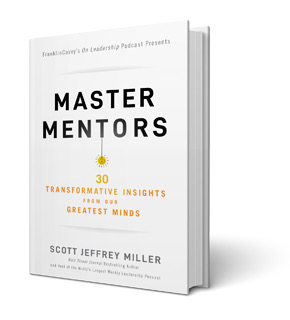
Be a light, not a judge. Be a model, not a critic. – Stephen R. Covey
Imagine having the opportunity to sit down with one great leader or thinker or entrepreneur…every week. In a private setting, you get to talk to them to learn what key insights they might offer in regards to their career success and/or the key lessons they have learned over the years. That is exactly what Scott Miller does each week in his Franklin Covey podcast, On Leadership.
Every day, I use audio books as a type of morning inspiration.I spend approximately 60 minutes with some of the great writers and thinkers of our day. I leave my house for my morning jog – I’m out before most are awake and my phone is on mute. For that time frame, I get to focus my mind on the thoughts of an author that I likely will never meet – but in those moments they become a type of mentor. Not in all areas and not for an extended time. More of a focused, topical mentoring.
Miller has written several books on leadership, management, and marketing. His books are engaging and practical reads for anyone seeking to advance their career or develop their leadership style. This book follows a similar pattern to his books, Management Mess to Leadership Success and Marketing Mess to Brand Success, both of which provided 30 lessons or challenges. In this case, he offers Master Mentors: 30 Transformative Insights from Our Greatest Minds.
In the Master Mentors, Miller introduces his audience and readers to the likes of Stephanie McMahon. If you’re a fan of professional wrestling, you know who Stephanie is and you know about her persona and her wealth. Miller could have focused on her marketing prowess and her company’s wealth. The WWE produces live shows throughout the year and twelve or more pay-per-views each year with hundreds of thousands participating live or online. They have more than one billion social followers. Instead, however, Miller emphasizes her sincere engagement. He recounts her focus on what his team needed and what they were looking for during this interaction. During her interview, she displays engaging empathy. More than an entertaining celebrity, she is a leader with skills worth emulation.
Another example from Miller’s book is his chapter with Eric Barker. Barker wrote the book, Barking Up the Wrong Tree: The Surprising Science Behind Why Everything You Know About Success Is (Mostly) Wrong. Barker identifies and dispels many of the myths around achieving success. While so many have accepted these tales and folklore as truth, he shares the results from studies and research in order to challenge these beliefs. Possibly most important, Barker challenges the reader to consider, “What have I come to believe about me, that someone well-intended, or perhaps less so, convinced me is true and doesn’t need to be any longer.” Just because some declare something to be true, doesn’t make it so. We all need to be able to evaluate statements and claims against an unbiased standard and apply the results accordingly.
There are so many great books out there that may well address any one of these issues in an in-depth manner. This book provides an introduction to many worthwhile topics and individuals that should garner further attention. In fact, the reader should come away with a list of many books to read in the months to come. Miller has offered many great tools and insights for those in leadership. Master Mentors is another example of inspiration and education.
